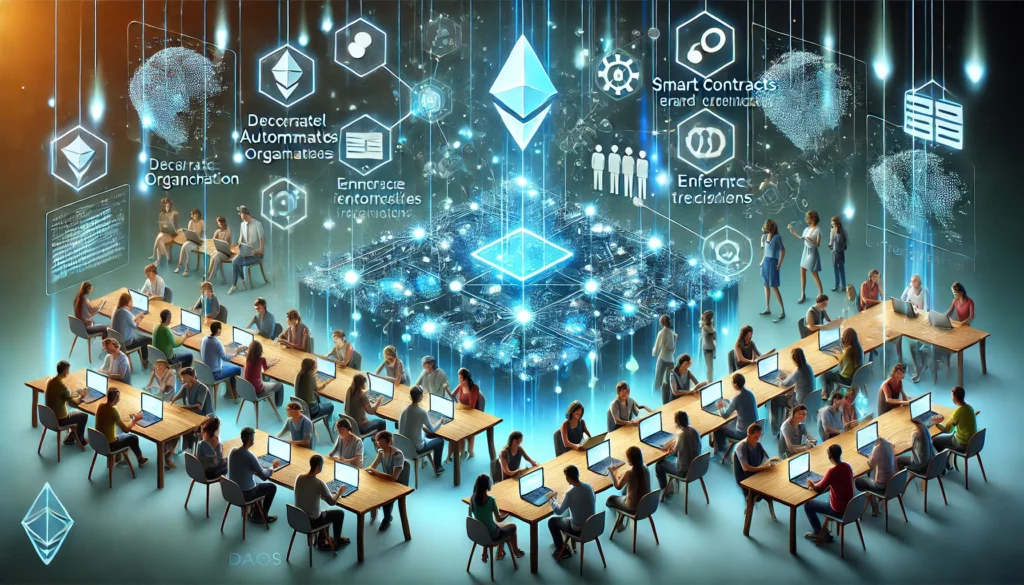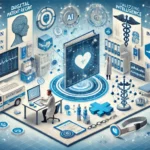In an increasingly digital and decentralized world, Decentralized Autonomous Organizations (DAOs) are emerging as a transformative force in governance. These blockchain-based entities enable individuals to collaborate, make decisions, and manage resources without relying on traditional hierarchies or centralized authorities. DAOs are reshaping the way communities, companies, and projects operate by promoting transparency, democracy, and efficiency.
This article explores the rise of DAOs, their potential applications, and the challenges they face as they redefine the future of governance.
What Are DAOs?
A DAO is an organization that operates through smart contracts on a blockchain. Instead of being managed by a centralized authority, DAOs are governed by their members, who make decisions collectively through voting mechanisms.
Key Characteristics of DAOs:
- Decentralization: Power is distributed among members, not concentrated in a single entity.
- Transparency: All actions and decisions are recorded on a public blockchain, ensuring accountability.
- Automation: Smart contracts execute predefined rules automatically, reducing the need for intermediaries.
How DAOs Work
1. Smart Contracts
The backbone of a DAO is its smart contract—a self-executing program that defines the rules and governance structure. For example:
- Voting thresholds.
- Allocation of funds.
- Member permissions.
2. Token-Based Governance
DAO members typically hold governance tokens, which grant voting rights. The weight of a vote often corresponds to the number of tokens owned, although some DAOs use alternative mechanisms to ensure fairness.
3. Proposals and Voting
Members can submit proposals for initiatives, changes, or resource allocations. Proposals are voted on by the community, and smart contracts automatically enforce the outcomes.
The Benefits of DAOs
1. Transparency
All decisions and transactions within a DAO are recorded on the blockchain, ensuring that members can verify actions and hold the organization accountable.
2. Inclusivity and Accessibility
DAOs enable global participation. Anyone with internet access and governance tokens can contribute, breaking down geographical and financial barriers.
3. Efficiency and Automation
Smart contracts eliminate the need for middlemen, reducing bureaucracy and speeding up decision-making processes.
4. Community-Centric Governance
DAOs prioritize the interests of their members rather than external stakeholders, aligning decision-making with community goals.
Applications of DAOs
DAOs are already making a significant impact across various industries and use cases:
1. DeFi Governance
Many decentralized finance (DeFi) protocols, such as Uniswap and Aave, use DAOs to manage their ecosystems. Token holders vote on protocol upgrades, fee structures, and liquidity incentives.
2. Crowdfunding and Investments
DAOs like The DAO (2016) and Venture DAOs allow members to pool funds and collectively decide on investments, democratizing venture capital.
3. Art and Culture
DAOs such as PleasrDAO enable members to collectively purchase and manage valuable art and digital assets, including NFTs.
4. Social Impact and Activism
DAOs like KlimaDAO focus on tackling climate change by funding carbon offset initiatives through a decentralized model.
5. Gaming and Metaverse
Projects like Decentraland DAO give users governance rights over virtual worlds, enabling players to decide on in-game rules and asset management.
Challenges Facing DAOs
Despite their promise, DAOs face several challenges that must be addressed for widespread adoption:
1. Scalability
Managing large-scale participation can be challenging, especially as the number of members and proposals grows.
2. Governance Inequality
Token-based voting can lead to power imbalances, with wealthier members having disproportionate influence.
3. Regulatory Uncertainty
Governments are still determining how to classify and regulate DAOs, creating potential legal risks.
4. Security Risks
Smart contracts are vulnerable to coding errors and hacks. High-profile DAO exploits, such as The DAO hack in 2016, highlight the need for rigorous auditing.
5. Decision-Making Speed
Democratic governance processes can be slow, making it difficult for DAOs to respond quickly to urgent matters.
The Future of DAOs
As blockchain technology evolves, DAOs are likely to play an increasingly prominent role in governance. Potential developments include:
1. Improved Voting Mechanisms
New voting models, such as quadratic voting or reputation-based systems, could address governance inequality and improve fairness.
2. Legal Recognition
Countries like the U.S. (Wyoming) are beginning to recognize DAOs as legal entities, paving the way for broader adoption and regulatory clarity.
3. Interoperability
Cross-chain technologies could enable DAOs to operate seamlessly across multiple blockchains, expanding their reach and functionality.
4. AI Integration
Combining DAOs with artificial intelligence could enhance decision-making processes by providing data-driven insights and automating routine tasks.
Conclusion
DAOs represent a bold step toward decentralized governance, empowering individuals to collectively manage resources and make decisions without the need for traditional hierarchies. By leveraging blockchain technology, DAOs are fostering transparency, inclusivity, and efficiency across various industries.
While challenges remain, the rise of DAOs signals a shift in how organizations operate, offering a glimpse into a future where governance is democratized and community-driven. As innovation continues and adoption grows, DAOs could become a cornerstone of the decentralized economy, reshaping not only how we collaborate but also how we envision the structures of power and control in the digital age.


